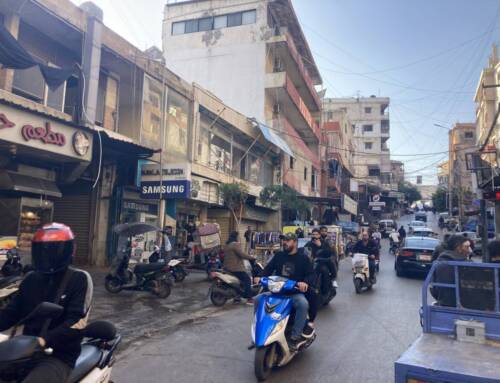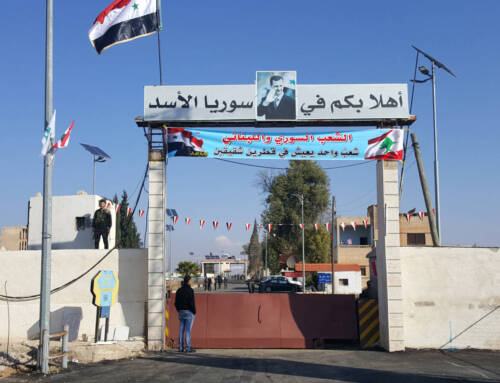A new bread crisis: Rukban on the brink of humanitarian catastrophe
With vital smuggling routes cut off by Damascus, residents of southern Syria’s Rukban camp are facing the latest in a long line of humanitarian crises, with no help in sight.
25 March 2022
PARIS — Women and children in the desert Rukban camp held a protest on Wednesday calling on the international community and humanitarian organizations to assume responsibility for the informal refugee settlement after Syrian government forces cut off smuggling routes that brought basic goods into the camp in mid-March and its sole bakery stopped producing bread.
In February, regime forces cut off smuggling routes supplying Rukban, a remote informal displacement camp located in a 55-kilometer-wide “deconfliction zone” in southern Syria, just inside the border with Jordan. As a result, the camp’s only bakery initially stopped producing bread on March 17, then went back to baking bread made from “bran fodder for animals,” according to Rukban Network, a local media source in the camp.
However, after residents rejected the bread with its new ingredients, “the bakery stopped working again, after it had been selling a bundle of bran bread for SYP 1,000 [$0.25 according to the parallel exchange rate],” camp resident Maryam al-Khalidi (a pseudonym), told Syria Direct.

Bread made from bran fodder in Rukban camp, 23/2/2022 (Maryam al-Khalidi/Syria Direct)
Al-Khalidi, a mother of two, said she had saved 10 kilograms of flour “for severe siege situations.” Since the bakery stopped working, she has been making bread by hand, but fears the flour she has could “run out” before food shipments arrive again. Before the camp’s supplies were cut off, a bundle of bread made with wheat flour was SYP 1,500 ($0.38), she said.
Worst flour crisis
Since Rukban’s inception in April 2015, the camp’s residents have experienced continuous humanitarian crises, with shortages of basic goods and medical supplies due to a siege imposed by the Syrian regime on the camp. Damascus prevents UN humanitarian aid from reaching Rukban via Damascus, and the last aid convoy entered in 2019.
Jordan stopped the entry of humanitarian aid to Rukban from to its territory in June 2016 after the Islamic State targeted a Jordanian border guard post. The country later allowed a one-off delivery of aid in August of the same year.
As a result of the siege imposed on the camp and the absence of humanitarian aid, Rukban’s residents rely on basic goods that enter through a group of smugglers. But “the regime stopped two cars carrying food supplies from entering about a month and a half ago,” according to media activist Imad Ghaly, who lives in Rukban. “As a result of food, especially flour, running out, we’ve entered into a new humanitarian catastrophe,” he added.
The regime has tightened its siege of Rukban from time to time in past years, preventing the passage of materials into the camp, but previously “the stopping period was less than two weeks,” Ghaly told Syria Direct.
Since the latest flour crisis began, Ghaly, who is married with three children, said they rely on other items, “such as milk, rice, bulgur and some other items that I store away.” But “they may not be enough for the coming week,” he said.
Many Rukban residents suffer from poor economic conditions due to a lack of work opportunities, but the problem as Ghaly sees it is not the money. “If I had a million dollars, and not a kilo of flour, what use is the paper in my hands?”
Asmaa al-Khalidi, another resident, said the flour cutoff has not impacted her yet, since she was able to set aside small amounts of flour, relying on “money my relatives send me to buy it each month.” But most people in the camp “are not able to store flour and use it when needed,” she said, and instead “buy bread day by day.”
She warned of a “real famine” in Rukban should the camp remain besieged and flour continue to be prevented from entering the camp. Even “those who are financially able won’t be able to secure their needs,” she said.
No international movement
On multiple occasions in recent months, the people of Rukban have organized protests calling on the international community to bear responsibility for the approximately 10,000 displaced Syrians in the camp.
In December 2021, besieged residents announced an open-ended sit-in, calling on the US-led international coalition—which maintains a garrison in the deconfliction zone where Rukban is located—to fulfill their right to receive medical treatment. In response, a US-led coalition medical team provided treatment to dozens of camp residents in February.
But most demands and protests end without a real response. The latest women-led sit-in on Wednesday, the first of its kind in Rukban, highlighted “the unprecedentedly poor living situation, and demonstrated the depth of suffering,” Ahmad al-Zarier, the husband of one of the residents who participated in the protest, told Syria Direct.
For his part, Abdelrazaq al-Mahya, the head of the press office of Jaish Maghawir al-Thawra, a coalition-backed opposition group operating in the deconfliction zone, said “the civilians’ calls are clear: for foodstuff to be secured, for the camp to be included on the list of UN-recognized camps, and for humanitarian organizations to be allowed to enter regularly.”
Al-Mahya said his faction was prepared to provide assistance to Rukban within its capabilities, but that “the camp needs international action that is beyond us.” Those in Rukban “need urgent humanitarian aid, and for a humanitarian corridor to be opened with neighboring countries,” he said, which would “put an end to the siege and starvation that the regime periodically adopts.”
The current bread crisis in Rukban coincides with broader concerns surrounding a global wheat crisis due to the Russian invasion of Ukraine. Regime-controlled areas are likely to be hit hardest by a crisis compared with other areas of influence in Syria, since Damascus relies on importing wheat from Russia. But fragile areas such as Rukban camp could be severely impacted because they rely on meeting their needs through smugglers from the black market in regime areas.
Activist Ghaly denounced “the failure of international coalition forces to respond to protesters’ demands a month and a half ago, which were directed at them,” as he put it, “and not providing any aid to the people.” He said he holds “the Assad regime responsible for starving the people of Rukban,” but that such a tactic “is not strange for the regime, as it used the starvation policy against its opponents in several Syrian regions.”
But “the international community’s silence towards the violations against us amounts to support for the regime,” said Ghaly. “Shame on the international community and international humanitarian organizations if they do not act to save the camp.”
This report was originally published in Arabic and translated into English by Mateo Nelson.







